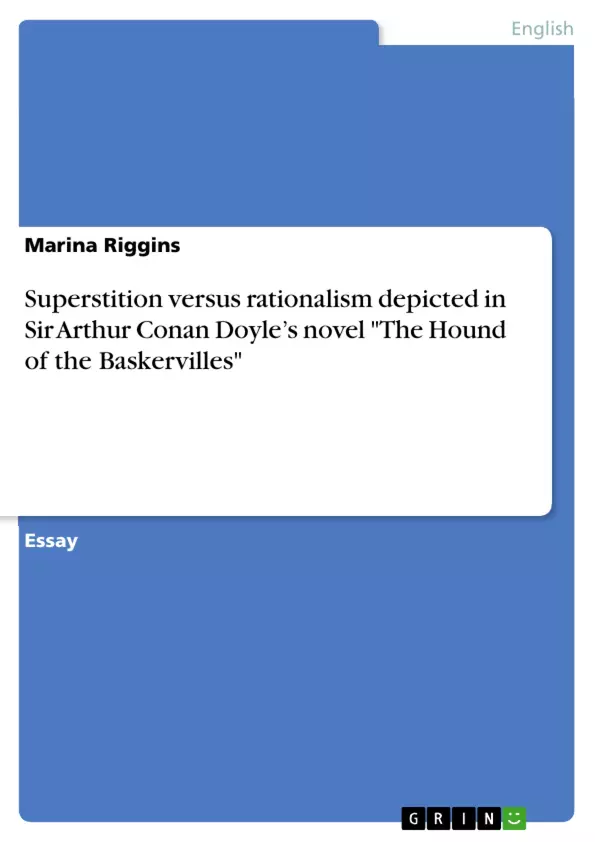This essay will observe how rationalism, logic, and scientific fact prevail against old-fashioned superstitions. Also, it will discuss how the background of Sir Arthur Conan Doyle helped to shape the character of Sherlock Holmes, and how the political situation in England was reflecting in the creation of such mastermind. Holmes is someone who does not believe in old fairy tales such as the existence of a hellish dog and a curse over the Baskervilles family. When Holmes is on the scene, logic is always present.
Additionally, the birth of the Gothic literature will be examined. The impact that Conan Doyle had on society by creating the genius mind, the logic-based thinker, Sherlock Holmes, was to create the foundation not only for the modern crime scene investigations, but also a model for the modern detective novel. Influential facts such as educational background of the author, influential figures in his life, the publishing of the Darwinian theory, “The Origins of Species”, and phrenology studies done by the author strongly influenced the creation of Sherlock Holmes and his scientifically based genius mind, fighting against old- fashioned superstitious beliefs.
Table of Contents
- Superstition Versus Rationalism Depicted in Sir Arthur Conan Doyle's Novel The Hound of the Baskervilles
- The Birth of a New Era and a New Thinker
- The Perfect Environment for the Gothic Literature
- The Impact of the Author’s Background
- Holmes, the Scientific Mind
- The Rise of Scientific Thinking
- Rationalism Versus Superstition
Objectives and Key Themes
This essay aims to explore the contrast between rationalism and superstition in Sir Arthur Conan Doyle's novel The Hound of the Baskervilles. It examines how the author uses the character of Sherlock Holmes to showcase the triumph of logic and scientific reasoning over traditional beliefs and fear.
- The clash between rationalism and superstition
- The role of the gothic literature in creating atmosphere and suspense
- The influence of the author's background on the character of Sherlock Holmes
- The impact of scientific advancements on societal thinking
- The development of forensic science and its representation in the novel
Chapter Summaries
- Superstition Versus Rationalism Depicted in Sir Arthur Conan Doyle's Novel The Hound of the Baskervilles: This section introduces the main topic of the essay, highlighting the contrasting themes of rationalism and superstition present in Sir Arthur Conan Doyle's novel The Hound of the Baskervilles. It also introduces the key character of Sherlock Holmes and his role in advocating for logic and scientific investigation.
- The Birth of a New Era and a New Thinker: This chapter explores the historical context of the novel's creation, highlighting the social and political turmoil of Victorian England. It also delves into the author's own background and how his experiences and beliefs influenced his characterization of Sherlock Holmes.
- The Perfect Environment for the Gothic Literature: This section examines the use of gothic elements in the novel, including the moors, fog, and ancient castles, to create a sense of fear and suspense. It also explores the allegorical significance of these elements in reflecting the anxieties of the time.
- The Impact of the Author’s Background: This section investigates the author's family history and how it shaped his writing. It discusses how Conan Doyle's Irish heritage and his experiences in medical school contributed to the creation of Sherlock Holmes as a scientific thinker.
- Holmes, the Scientific Mind: This section focuses on the development of Sherlock Holmes as a character, emphasizing his reliance on logic, observation, and scientific reasoning in solving mysteries. It highlights the influence of the author's own scientific interests on the character's personality and approach.
- The Rise of Scientific Thinking: This section examines the changing societal perspectives in Victorian England, where scientific advancements and rational thinking began to challenge traditional beliefs and superstitions. It analyzes how the novel reflects this shift in attitudes towards the world.
- Rationalism Versus Superstition: This chapter delves into the conflict between rationalism and superstition in the novel, focusing on the contrasting views of Sherlock Holmes and other characters who readily accept the legend of the hound. It showcases the author's portrayal of the struggle between logic and fear in a time of significant societal change.
Keywords
The Hound of the Baskervilles, Sir Arthur Conan Doyle, Sherlock Holmes, rationalism, superstition, gothic literature, Victorian England, scientific thinking, forensic science, medical background, dualism, colonialism, imperialism, The Origins of Species, phrenology.
- Arbeit zitieren
- Marina Riggins (Autor:in), 2018, Superstition versus rationalism depicted in Sir Arthur Conan Doyle’s novel "The Hound of the Baskervilles", München, GRIN Verlag, https://www.grin.com/document/541626



